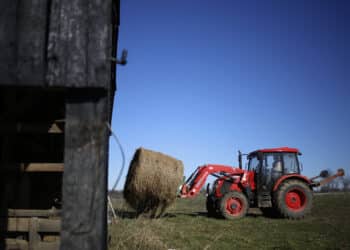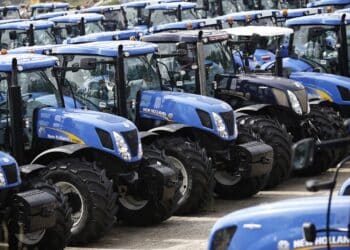CNH Industrial Capital revenue climbs 4%
CNH agriculture equipment sales declined 10.5% YoY in Q3
CNH Industrial Capital posted higher revenue in the third quarter despite decreased originations and lower equipment sales across the parent company’s two largest segments.
While farm and construction equipment manufacturer CNH Industrial continued to feel the strain of tariffs and prolonged challenges facing farmers in Q3, its strategy of minimizing production paid off for dealers, Chief Executive Gerrit Marx said during today’s earnings call.
“Our ag dealers’ new inventory levels saw another sequential decline of over $200 million, putting them on track to achieve our targeted levels over the next three to four months,” he said. “Our North American dealers’ used inventory also saw another sequential decline in the quarter.”
The company plans to maintain low production hours through early 2026 amid soft demand, Marx said. To make “appropriate shifts in production cadence,” CNH will closely monitor commodity prices, progress on trade deals, stocks-to-use ratios, renewable fuel policies in the United States, used inventory levels and pricing dynamics, he said.
BY THE NUMBERS: For Q3, CNH Industrial Capital reported:
- Revenue rose 3.8% YoY to $684 million;
- Retail loan originations declined 6.5% YoY to $2.7 billion;
- Its managed portfolio dropped to $28.5 billion, down 1.7% YoY;
- Net income dropped 39.7% YoY to $47 million; and
- Delinquencies of more than 30 days rose 1.3 percentage points YoY to 3.5%.
The decline in net income was attributed to increased risk costs, decreased originations, and higher selling, general and administrative expenses, according to the company’s earnings statement.
Its managed portfolio fell largely due to lower dealer inventories, and while credit collections have been steady in most regions, the lender is experiencing “persistent delinquencies in Brazil,” Chief Financial Officer Jim Nickolas said during the call.
“Accordingly, we increased our credit reserves again in the quarter,” he said. “We believe that our reserves are adequate. … Our experience from past cycles is that most farmers in delinquent status will eventually catch up on their commitments, but this increase in risk reserves is a needed measure while observing how the market environment unfolds.”
Meanwhile, CNH Industrial reported these sales figures in Q3:
- Global industrial sales declined 7.4% YoY to $3.7 billion;
- Global agriculture sales dropped 10.5% YoY to $3 billion;
- Global construction sales increased 7.6% YoY to $739 million; and
- Net income decreased 78.4% YoY to $67 million.
STATE OF PLAY: The company felt the “delayed impact of tariffs” in Q3 after pricing adjustments for new orders received after May 1 mitigated tariff impacts in Q2, Marx said.
“It is our intention that we will eventually offset all the tariff cost impact through cost mitigation, structure realignment and pricing action in 2025,” he said. “However, we are absorbing some of the impact alongside our suppliers, network, partners, farmers and builders.”
Expanded Section 232 tariffs “will impact all players in the industry, whether their components are imported or locally sourced, as domestic steel and aluminum prices will rise as well,” Marx said.
Reflecting the Section 232 expansion, the company anticipates a net tariff impact of $250 million for its agriculture segment in 2025 and $100 million for its construction segment, Nickolas said.
MARKET REACTION: Shares of CNH Industrial [NYSE: CNH] were down 5.9% from market open to $9.66 as of market close today. It has a market capitalization of $11.9 billion.
Check out our exclusive industry data here.









